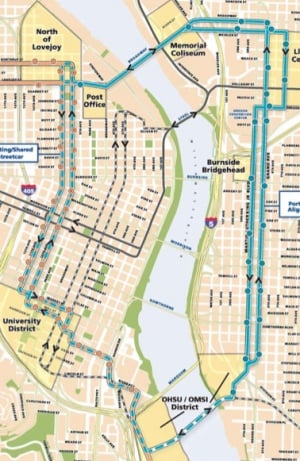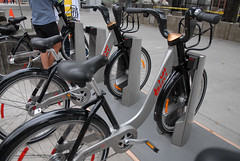It’s been over four years since the City of Portland first announced their interest in bike-sharing. They’ve held off for a number of reasons; but new developments show that the plan could come to fruition sooner than you might think.
A panel discussion on the topic at the Oregon Active Transportation Summit last month revealed that the idea to bring a large-scale bike-sharing system to Portland is once again gaining steam.
Bike-sharing in Portland has at least some amount of all the essential ingredients required to pull it off: a potential funding source (for start-up costs), interest from the private sector (for operating costs), influential supporters, and support from City of Portland staff and Mayor Sam Adams.
“A couple [health care companies] have shown real interest in potentially sponsoring them [the bikes].”
— Steve Gutmann, Portland Sustainability Institute
As we reported back in January, the current concept being worked on by the City of Portland is to create a bike-share system in the Central City (on both sides of the river, see map below). The biggest hurdle right now is start-up funding, which PBOT estimates at about $4 million (based on Portland’s proposed 750 bike/74 kiosk system).
Portland’s best chance at snagging a significant portion of that start-up money is a pot of Federal Flexible Funds that will be handed out by Metro. The Central City bike share project is expected to compete well for those funds, but it’s far from a slam dunk.

While PBOT touts that the Central City Bike Share project will lead to thousands of new bike trips and give 35-50,000 Portland residents (40% of which are low-income) access to free/cheap transportation, members of the Portland Bike Advisory Committee are weighing that project against active transportation investments in East Portland.
Dan Bower, who works for the City of Portland’s Transportation Options Division (where the bike-sharing project resides), told us that, “A lot hinges on those flexible funds.” Bower acknowledges those funds aren’t a sure thing, but he said his team has put the project, “On a path to yes.” Given that PBOT Director Tom Miller and Portland Mayor Sam Adams are both supportive of the idea, Bower says he has “given them a recipe” for the project to come to fruition.
Assuming that PBOT wins the $4 million flexible funds for start-up costs, Steve Gutmann, a bike-share expert and Finance Innovation Director at the Portland Sustainability Institute, told attendees at the Oregon Active Transportation Summit last month that Portland’s system would cost about $750,000 per year to operate (based on $2,000 per bike per year and assuming half of that is recouped through user fees).
How will that operations expense be funded? A public-private partnership seems likely.
Gutmann says that he’s already approached major health care companies in the region including Legacy Emanuel, ODS, and others. “A couple have shown real interest in potentially sponsoring them [the rental bikes],” he said at the summit last month.
I’ve been an advocate for a public-private partnership… There’s a potential for some real private connections.”
— Rick Gustafson, Director of Operations, Portland Streetcar Inc.
Along with Gutmann, other local transportation insiders who are actively working for bike-share in Portland are Rob Sadowsky, leader of the Bicycle Transportation Alliance and Rick Gustafson, who has a long history in regional politics and transportation circles and is currently the Director of Operations for the Portland Streetcar project.
Gustafson, a former senior planner for TriMet, is an unabashed supporter of bike-sharing in Portland. “I regard it as a personal embarrassment for this region to not have a bike share program when other cities have done it,” he said, somewhat in jest, during a phone interview a few days ago.
Like Gutmann, Gustafson feels a private partnership is the way to make the project happen. “I’ve been an advocate for a public-private partnership… There’s a potential for some real private connections.”
To act as a buffer between city government and private companies, Gustafson feels a non-profit to operate and maintain Portland’s bike-share system — similar to Portland Streetcar Inc. — should emerge.
It’s hard to overstate the significance of Gustafson’s involvement in the bike-sharing equation. He’s widely respected when it comes to urban transportation and his role as a key figure in Portland’s streetcar renaissance make him an influential voice.
For his part, Mayor Adams (who oversees PBOT) says he hopes Portland will have a bike-share system by the end of this year. It was Adams who first pushed for the idea four years ago after he saw a bike-share system in action during a visit to Lyon, France.
Adams says he’s happy his staff and other experts have waited to make sure it’s the right thing for Portland, but he told me during an interview earlier this week that, “I think they’re right [to have waited], but I’ve been anxious to move it forward.”
As for funding the project, Adams knows that simply giving a corporation advertising space on the bikes and kiosks, isn’t politically viable. “I don’t want to trash Portland with that kind of advertising and I don’t think Portlanders would support that,” he said, “So, we’re coming up with some other ways to pay for it. These things don’t pay for themselves, but then again, every transportation mode is subsidized to a certain degree.”
Finding the money isn’t the only reason this project could pose a challenge for Adams. If it moves forward, advocates and community leaders from East Portland are likely to see it as just another example of how close-in residents are getting more attention while streets outside their homes are still without sidewalks and bike lanes.
— Stay tuned for more developments on this story. Read more about Portland’s long relationship with bike-sharing in our story archives.


